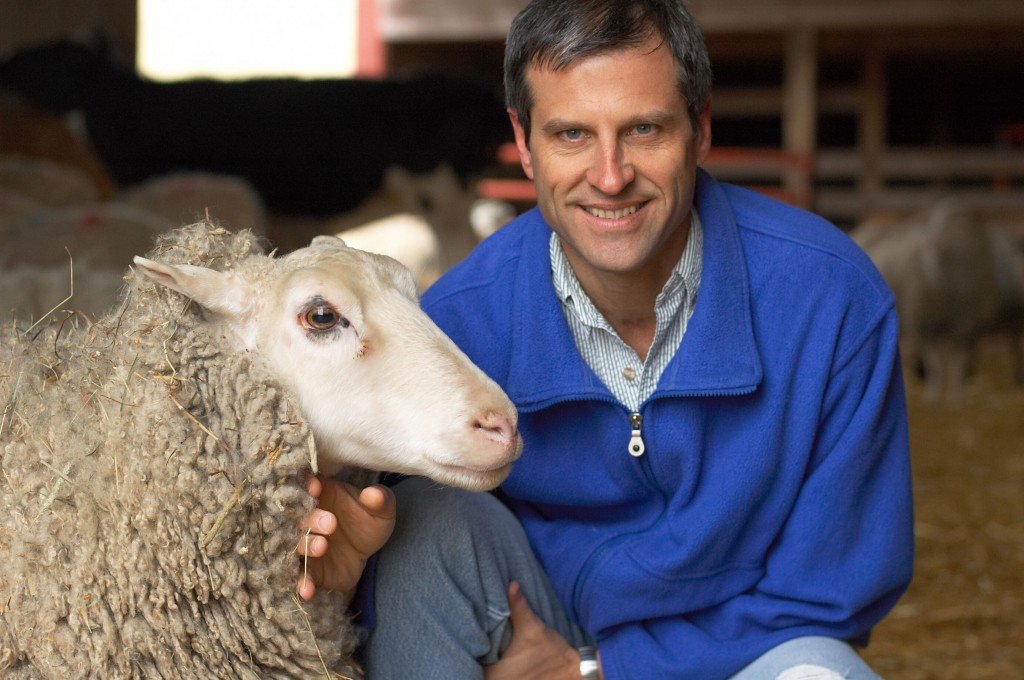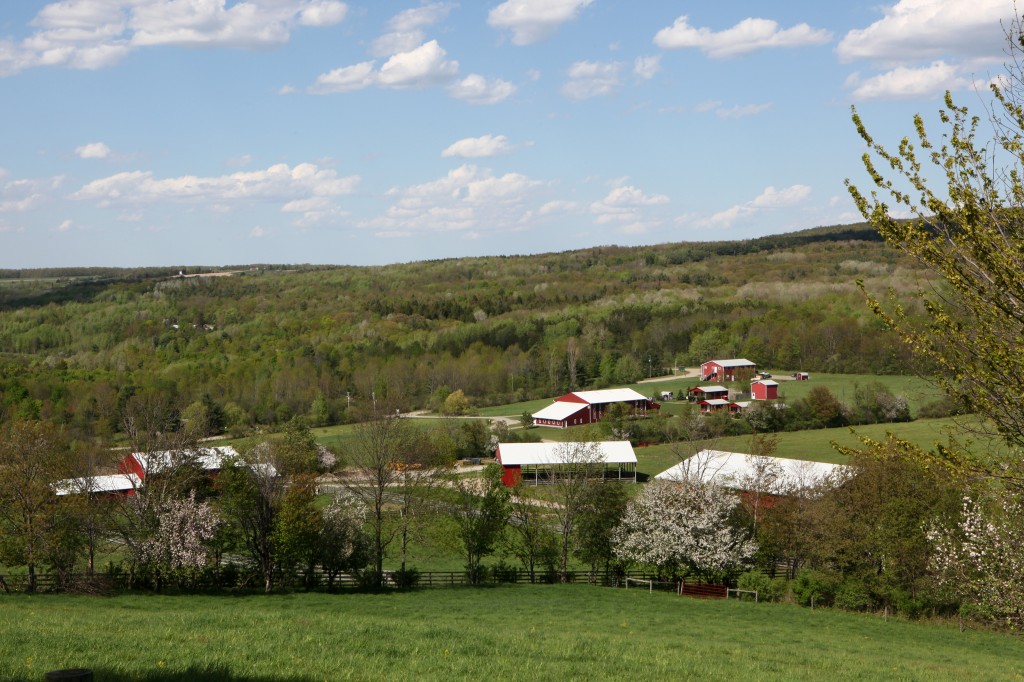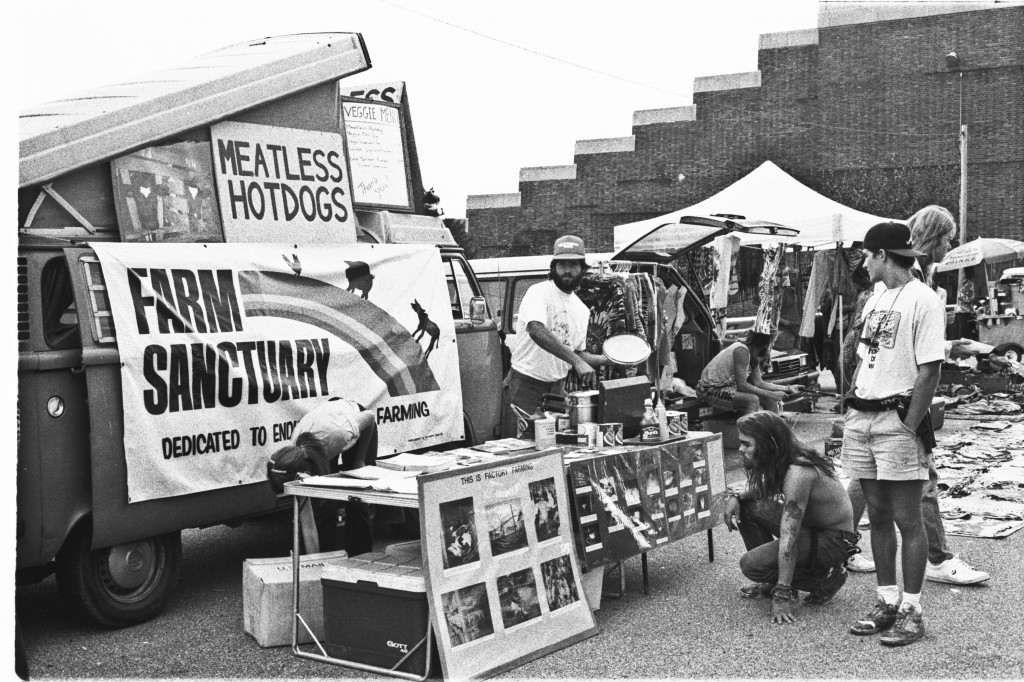With The Grateful Dead’s 50th Anniversary shows approaching, and HeadCount organizing a "Participation Row" non-profit village at the shows, we are running a series of interviews with key people from non-profits and various social good initiatives tied to the Grateful Dead. Today, we talk to animal rights activist Gene Baur. Click here to view other interviews in the series.

Gene Baur is an animal rights activist and the co-founder & president of Farm Sanctuary. He is also an author, his latest cookbook “Living the Farm Sanctuary Life” landing him an interview slot on The Daily Show this spring. He is truly a man who has spent his entire life advocating for beliefs that he is deeply passionate about. As of late, he has been in contact with Soldier Field to ensure there will be vegan options at the concession stand during July’s Fare Thee Well performances. I recently spoke to Gene about his book, his vegan lifestyle, and the special role the Grateful Dead has had on his journey...
In your latest book you mention that Farm Sanctuary has been called “The Happiest Place on Earth”, can you speak a little bit about what you believe makes this statement true?
It’s a place where animals are our friends, not our food. It’s a place where animals aren’t afraid of us and it’s a very peaceful, relaxing sanctuary for both animals and people. The idea of living the Farm Sanctuary life is aligning living with our values. So often people who are eating animal foods are complicit because most people are humane and yet they are supporting an industry that is an affront to their own humanity. So there is this dissidence that a lot of people live with. At Farm Sanctuary we can look at the animals, know they’re having a good life and we can feel good about it. It’s really about just living in alignment with our values and that makes you feel pretty good.
[caption id="attachment_28865" align="aligncenter" width="640"] A Happy View. Photo courtesy of Farm Sanctuary[/caption]
A Happy View. Photo courtesy of Farm Sanctuary[/caption]
Your early fundraising ventures involved selling tofu hotdogs in the parking lots of Grateful Dead shows. Do you remember the first one of these shows that you attended in this type of way?
I don’t remember the first one. But there were a number of them and it was mainly on the East coast, starting in the spring of 1986.
Did you get involved in the Grateful Dead scene via the music or was it more the disposition of the fans that drew you to sell food at their events?
It was the whole scene, the similar mindset, the open-mindedness and the fact that these are folks that, generally, were interested in living outside the status quo. And being vegetarian or vegan back at that time was certainly being outside the status quo. It’s becoming more and more accepted now and more and more mainstream and I am very encouraged by that. In fact I believe that they are going to be selling veggie dogs at Soldier Field in July when the Dead play there. So going from being in the parking lot selling veggie hot dogs out of our Volkswagen van to veggie dogs being sold inside the venue is a pretty positive step in that direction.
It was your mission get the Chicago shows to serve a vegan option. How did you go about making this a reality? Was this important to you because it was how you got your start fundraising?
Yes. We felt that it would just be a beautiful and symbolic statement and a friend of mine, Leilani Munter, is a vegan race car driver whose brother-in-law just happens to be Bob Weir. So my first call was to Leilani who connected me with some of his management who got in touch with Soldier Field, encouraging them to sell veggie dogs and other vegan food.
[caption id="attachment_28867" align="aligncenter" width="640"] Back where it all began...
Back where it all began...
Photo courtesy of Farm Sanctuary[/caption]
You mentioned in your recent book that Peter Seeger and Peter, Paul, and Mary are some of your musical influences: can you name any others?
Well of course the Grateful Dead. I love what they do and I just love the whole scene traveling around the Grateful Dead. But for me activism is core and that’s why I was really moved by folks like Pete Seeger since High School and continued to be throughout my life and still am, really. And then there are also people like Joan Baez who I really felt raised issues that needed to be raised. So that’s a big part of my musical inclination: towards advocacy and activism. A lot of the hippie stuff too and just the counter-culture and challenging the status quo and challenging assumptions. That’s the kind of art, that’s the kind of music that’s the kind of way I like. I like to challenge things and just learn to be better.
Do you remember the circumstances behind your decision, in 1985, to become a vegan?
It was a process. I learned about veal in high school, how veal cows are chained by the neck in their crates. When my grandmother told me about that I stopped eating veal and then through college I learned more about the numerous harms caused by animal agriculture and the inefficiency of animal production as compared to growing plants and eating plants directly. Then I learned that it was actually possible to live well without eating any animal foods, without eating meat, dairy, or eggs. And I thought if I can live well without causing any unnecessary harm, why wouldn’t I? So that was really it. It was just a progression and finally a revolution that I could actually be vegan. And that’s why I made the decision.
What do you think is the most important key to successfully sticking to a vegan diet and creating a lifestyle around that choice?
When people are criticizing you for making these decisions you just have to let it roll off your back and recognize that what you’re doing is in your interest, it is aligned with living in the better world, and for me it’s just recognizing all of the many benefits of it. For some people it’s just about animals, or it’s just about health or it’s just about the environment. I think having a holistic approach helps people stay with it. And also recognizing that we are creatures of habit and that changing from being a typical meat eater one day to becoming a vegan over night is something that very few people do. It’s usually a progression and people do it in stages and each person does it in their own time and in their own way. Just eating fewer animal products is positive, substituting them with more plant foods is positive. Take it step by step and don’t be too hard on yourself if you are not the perfect vegan immediately because at the end of the day, nobody’s perfect. We’re all works in progress and we can all do better so we should work to do better. Don’t be too hard on yourself if you find that it takes a while to be completely plant-based in terms of eating.
Do you just wrote this new cook book, you’ve been part of getting a lot of legislation passed in terms of animal rights so what does your typical work week look like with all of these different things that you do?
It really varies. I don’t have a typical week. I travel a lot. This week I’ve been all over Miami. I’ve been talking about the book and doing some media stuff like newspaper talks, television stuff. I’m going to be speaking with culinary students tomorrow at Johnson & Wales Culinary School about the benefits of plant-based foods and the growing interest among consumers. I work with professionals like that. I’m also often in contact with health professionals encouraging them to speak more about plant based eating with their patients. A lot of what I do now is just education and outreach to our supporters, to schools, and to people who have aligned interests.
Are you going to any of the Dead 50 shows?
I hope so. I haven’t made any arrangements yet. I would love to go, I just have to see if that’s possible.
Any other comment you would like to leave our readers?
It’s never been a better time to be a vegan. There are more options available now than there ever have been before and I am deeply grateful for the history that we have had with the Grateful Dead concerts and the opportunities that were presented there to get this organization off the ground. I just feel very grateful and very fortunate to be doing something that I believe in and that all started selling veggie dogs and Grateful Dead shows.
